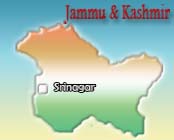Voters turn out in Kashmir despite separatist boycott call
 Srinagar, India - Voters turned out for the legislative assembly election in India's Jammu and Kashmir state Monday, despite a boycott call by separatist political parties and threats by militants.
Srinagar, India - Voters turned out for the legislative assembly election in India's Jammu and Kashmir state Monday, despite a boycott call by separatist political parties and threats by militants.
Thousands of Indian Army troops and police provided security for voters in the 10 constituencies where the first of the seven-phase staggered elections are being held.
The response of voters was varied across constituencies. A turnout of 25 per cent was reported in Bandipora in the Kashmir valley and 60 per cent in Jammu constituency with two hours of polling remaining.
Elections in the troubled region, which has seen a violent secessionist movement that has taken more than 50,000 lives since the mid-1980s, are routinely seen as a test for Indian rule.
The disputed region is currently divided into two parts, one administered by India and the other by neighbouring Pakistan. The nuclear-capable South Asian neighbours have fought two wars over the region.
Besides the Muslim-dominated Kashmir valley, India's Jammu and Kashmir state comprises the Ladakh region, which has a large Buddhist population, and the lower reaches of Jammu which is largely populated by Hindus.
The response was lowest in Bandipora, about 35 kilometres north of state capital Srinagar, where four youths were killed during anti-government protests earlier this year.
The widespread rioting and protests were triggered by a temple land dispute which escalated into pro-independence agitation in the Kashmir valley led by the separatist Hurriyat Conference.
More than 40 people, most of them Muslims, died during the unrest. Many of them were killed in police firing.
Separatist leaders, several of whom have been detained in the run-up to the elections, called for a boycott, hoping a poor voter turnout would support their claim that the people are opposed to what they term India's governance by force in the valley.
"Elections are a meaningless process. International organizations should intervene to help solve the Kashmir issue according to the aspirations of Kashmiris," Abdul Qayum, president of the Srinagar bar association and a leader of the coordination committee spearheading the anti-India protests, said.
"We are not interested in the election process. Our schools have been turned into barracks since the elections were announced," said Nazir Mohammed Shaikh, a student.
Barring a small clash between the police and a group of people protesting against the elections in Bandipora town and another between members of two parties in the neighbouring Sonawari constituency, balloting was progressing smoothly, an Election Commission official said.
"We came to vote because we want better roads, electricity connections and other facilities," said Gul Mohammed, a voter in Guarez, another constituency in the Kashmir valley which posted a turnout of 43 per cent till late afternoon.
Observers say the turnout is relatively high when compared to past elections in the state. The voter turnout in the last elections held in 2002 saw an overall turnout of 44 per cent, with only a 29 per cent turnout in the valley.
The latest figures are, however, bound to change, once the seven-phase elections are completed.
Voting in Srinagar, the centre of the protests earlier this year, are being held in the last phase on December 24.
The staggered elections were called by India's Election Commission to allow the government to provide maximum security cover to voters and contestants given a past history of violent attacks by militants
An alliance of the Indian National Congress Party and the regional People's Democratic Party came to power after the elections in 2002.
The Congress Party chief minister Ghulam Nabi Azad resigned after the violent protests earlier this year and the state is now under federal rule.
An estimated 500,000 Indian troops are stationed in the valley, guarding the border with Pakistan and fighting militants. (dpa)